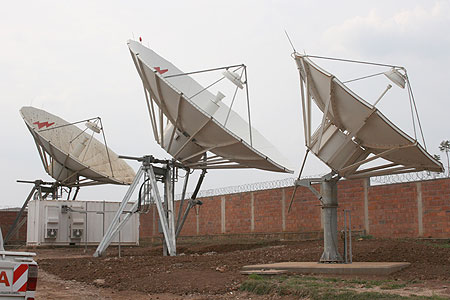When the Rwanda Utilities Regulatory Authority (RURA) published user statistics midway through this year, Tigo Rwanda, the new entrant to the market had surpassed Rwandatel, the oldest serving.


When the Rwanda Utilities Regulatory Authority (RURA) published user statistics midway through this year, Tigo Rwanda, the new entrant to the market had surpassed Rwandatel, the oldest serving. The report was a clear indication that the Rwandan telecom market was experiencing the effects of increased competition.
So intense has the competition been in the last six months that were fought over in the bruising price wars between the GSM incumbent MTN Rwanda, Rwandatel and Tigo.
While pointing out to recent developments such as the onset of the coastal under-sea cables, players predict that intense competition will largely depend on the provision of data and not voice, in the coming days.
While this may be a strategic shift potentially transforming how business is undertaken, the main challenge lies squarely with the three players and how they will relate to the market.
Without a doubt, data (generally) and internet (in particular), offer the next frontier in the fierce turf wars within telecoms whereby players will seek more penetration into rural and other underserved markets.
The provision of bandwidth specifically for purposes of data transmission is currently controlled by Rwandatel with a 70 percent market share. With the rapidly changing landscape, Rwandatel appears to be digging in to sustain its leadership position as rivals MTN Rwanda and Tigo jostle for more market share.
"The delivery of the undersea cable and the subsequent impact on the price per megabyte has further facilitated the market’s appetite for bandwidth and creation of new content. At Rwandatel, we recognized these twin forces of interconnection and access”, Francis Egbuson Rwandatel’s Chief Commercial Officer told Business Times.
Egbuson added that Rwandatel, while anticipating heightened competition from its rivals is investing in building a robust and fully redundant data and internet network along with additional human capacity to deliver a better customer experience.
Rwandatel says that it has deployed 214 Mbps of satellite bandwidth to back up the 310 Mbps which it receives from the Seacom cable to bolster its position in the market.
As part of its new campaigns, Rwandatel is set to introduce a new solution targeting small and medium enterprises while its large business segment solutions offering Internet bandwidth of any quantity via copper, fiber, wireless are also set for further revamping.
Rwandatel’s inter-branch connectivity solution which is based on the virtual local area network (vlan) service has been widely used by over 95 percent of all local financial institutions including the Central Bank. Of late, such lucrative segments are being eyed by the two rivals.
Given the strategies laid by other players like MTN it is anticipated that Rwandan consumers shall benefit more from price reductions for Internet service provision following the launch of the Eastern Africa Submarine Cable System (EASSy) recently.
The EASSy cable, like Seacom being utilized by Rwandatel, is an undersea high speed internet cable system connecting 21 African countries from Southern Africa to the north and the rest of the world.
Consequently market analysts have predicted that EASSy’s arrival in Rwanda will definitely lead to a further reduction in the cost of Internet and at the same time boost reliability.
A source at MTN Rwanda who spoke on condition of anonymity said the company is looking at ways of reducing its pricing structures for data as a matter of priority. Naturally such a scenario would enable the company to pass on this reduction to customers.
The entry of Seacom and TEAMs in the region last year led to a 75 percent Internet price reduction which was followed by increasing Internet speeds. However, experts say that while prices have come down significantly, reliability of Internet delivered via the undersea cables is yet to be satisfactory in Rwanda.
One way of addressing this challenge of Internet reliability is through acquisition by the three players of more fibre optic internet capacity from all the three cables. This is MTN Rwanda’s very likely strategy in the coming days.
However, efforts by The Business Times to get firm reports from MTN Rwanda senior marketing manager Yvonne Makolo went unanswered.Despite huge investments in the telecom industry amounting to more than $200 million in the last three years only Internet costs are still high with Internet being satellite-based.
Sending an email from Kigali to Nairobi means it is routed through Europe, then back to Nairobi. Operators and the regulator RURA are yet to come up with a solution to keep traffic within Rwanda.
Karen Rose, a director at the Internet Society, says that the per megabyte satellite connectivity costs of between $20,000 and $50,000 or more in many African countries, dampens growth and ships precious financial resources overseas.
Ends


